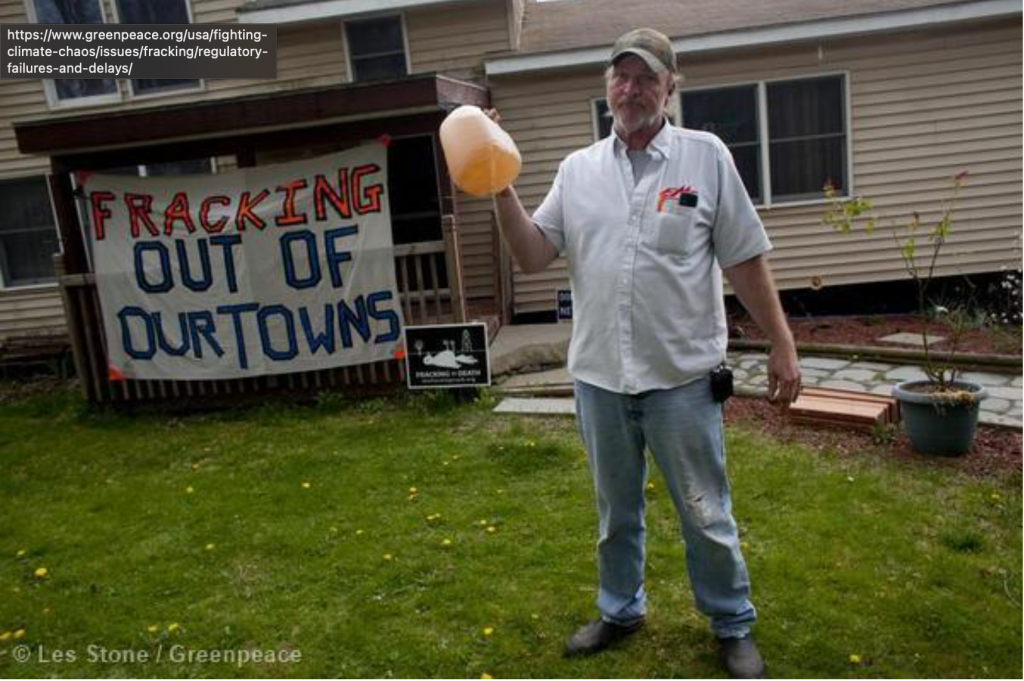
By: Regina Trevizo
Hydraulic fracturing, otherwise known as fracking, is the invasive method used to extract gas and oil from deep rock formations.[1] By forcing water, sand, and a mix of chemicals into horizontally drilled wells, drilling operators cause the shale to crack and release natural gas and oil.[2] Although this seems like an easy enough process, hydraulic fracturing poses significant health and environmental risks such as water pollution, seismic activity, and emissions of air pollutants. Although there are some federal regulations in place to minimize damages from fracking, fracking regulations are largely implemented at the state governing level. However, there are many fallbacks to state-by-state regulations, such as inconsistent standards, regulatory competition, and conflict of interests.
States with high fracking activity, such as Texas and Oklahoma, have the most to gain from Fracking and are therefore strongly incentivized to regulate loosely. For instance, in 2015, Oklahoma passed SB 809 which created a regulatory agency with full authority over the regulation of the oil and gas industry within the state.[3] Although this act may at first seem to provide efficient regulation over fracking in the state, this bill stripped cities and municipalities of their authority to regulate fracking within their jurisdictions and fully gave that authority to the Oklahoma Corporation Commission, making it illegal for cities to ban fracking.[4]
Legal loopholes exempt fracking from certain elements of the Safe Drinking Water Act and the Environmental Protection Agency’s hazardous-waste laws, endangering surrounding communities and putting drinking water at risk of contamination. One important exception from the Safe Drinking Water Act is commonly known as the Halliburton loophole. The Halliburton loophole exempts fracking industries from having to disclose the harmful chemicals they use in the fracking process and prevents the EPA from regulating fracking fluids.[5]
The oil and gas industry is also exempt from federal EPA hazardous waste regulations and Superfund regulations, which exclude waste associated with the exploration and development of oil and natural gas.[6] Drilling fluids, produced water, and other waste are not disposed of as hazardous and are exempt from the hazardous-waste cleanup process when it comes to spills or leaks.[7]
Flowback and produced water may contain heavy metals such as barium and lead, hydrocarbons, radioactive material, and high levels of salinity.[8] The risk to drinking water comes in two major ways. Firstly, water used in the fracking process can leak into aquifers and other groundwater supplies and secondly, the wastewater that fracking produces can contaminate supplies when waste leaks from multiple sources such as landfills that contain oil remains, trucks or pipelines transporting it, equipment failure, or unlined disposal pits.[9]
With hydraulic fracturing drastically increasing, federal regulations on fracking should be governing the oil and gas industry by requiring states to meet basic measures to protect people, the environment, and our limited resources. Fracking has left its mark in our communities and people on both the national and state level are calling for a change.
Citations
- Hydraulic Fracturing, INDEPENDENT PETROLEUM ASSOCIATION OF AMERICA, https://www.ipaa.org/fracking/.
- Id.
- Sara Douki, A National Problem with No National Solution, THE GEORGETOWN ENVIRONMENTAL LAW REVIEW (February 26, 2020), https://www.law.georgetown.edu/environmental-law-review/blog/a-national-problem- with-no-national-solution/.
- Supra note 3.
- Fracking: Regulatory Failures and Delays, GREENPEACE, https://www.greenpeace.org/usa/fighting-climate-chaos/issues/fracking/regulatory- failures-and-delays/.
- Elena Bruess, How Fracking Has Contaminated Drinking Water, CONSUMER REPORTS (December 3, 2020), https://www.consumerreports.org/water-contamination/how- fracking-has-contaminated-drinking-water- a1256135490/#:~:text=Drilling%20fluids%2C%20produced%20water%2C%20and,gas% 20waste%20was%20not%20hazardous.
- Supra note 6.
- Supra note 6.
- Supra note 6.
